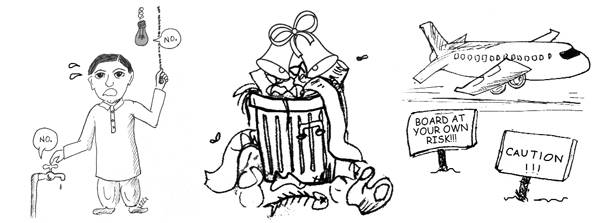
How to become ‘Asian tiger’
Sir,
On 5th December 2014, Korean Air Flight 86 from the JFK Airport in New York to Seoul, South Korea – which had just moved about 10 meters – returned on the orders of the airline’s vice president Heather Cho, daughter of the multi-billionaire Cho Hang Ho, the chairman of the Hanjin Group which owns Korean Air, Hanjin Shipping, Hanjin Transportation and many other companies.
Cho, seated in the first class section, became angry when she was served nuts in a packet instead of a bowl, and ordered the pilot to return and offload the flight purser. Under aviation law, once an aircraft has pushed back after permission from ground control, it can only return for technical reasons or in case of an emergency. As a consequence, Korean Air 86 was delayed by 20 minutes and arrived late at Seoul by only 11 minutes.
Korea’s Ministry of Transportation launched an investigation into the breach of privilege and violation of aviation law. Heather Cho was forced to resign from Hanjin Group, and is in prison facing charges of forcing a flight to change its normal route, use of violence against flight crew, hindering a government probe and forcing a flight purser off the plane. If guilty of all these charges, she faces 15 years in prison.
South Korea, a country with almost no natural resources, has become an ‘Asian tiger’ in just 30 years because of rule of law, strict state regulatory controls, fiscal discipline, investment in education and a strong independent judiciary and law enforcement system. It has a democratic system of governance with strong institutions, which through development of human resources and acquisition of technological knowledge in just about three decades is home to some of world’s leading multinationals like Samsung, LG, LOTTE, Hyundai, Hanjin, Daewoo, Doosan, and Hana Financial Group.
South Korea’s market economy ranks 15th in the world by GDP and 12th by purchasing power. Through good governance and education, it transformed overpopulation, a liability, into an asset by building a large motivated internal consumer economy. Its GDP per capita in 2010 was $30,000 as compared to $2,300 in 1980. By 2013 it had a record surplus of $70.7 billion over its current account, up 47% from 2012.
Riaz Najam,
Islamabad.
Flying blind
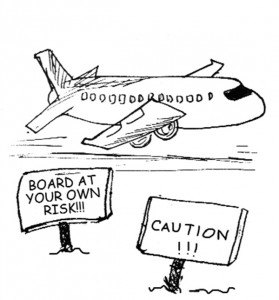
Sir,
Ever since the VVIPs of Pakistan have started traveling on state or self owned private jets, governments in power have shown a casual disregard to performance and flight safety of airlines regulated by the state. This has led to a rise in accidents, callous neglect of passenger convenience, and frequent imposition of partial bans by the European Union and other entities.
The Civil Aviation Authority of Pakistan has made public its investigation report about the April 20, 2012 plane crash resulting in 127 deaths, including the crew of that ill-fated flight from Karachi to Islamabad. The CAA and the federal government must understand that the people whose taxes fund the CAA and whose interest this organization is required by law to safeguard, have to be satisfied by the regulatory authority.
Without going into the merits and demerits of the investigation, or the professional competence of those at the helm in the CAA, if we are to accept the findings of this investigation at face value, questions arise as to what remedial action and punitive steps the authority has taken against those within its fold responsible for licensing the crew, granting an AOC to Bhoja Air, and issuing it a license which requires the financial capacity and infrastructure to meet all eventualities, such as accidents.
Was it not the legal and moral obligation of the CAA to ensure that Bhoja Air had sufficient financial resources and insurance cover to compensate the victims of the air crash? What legal and procedural steps has the CAA taken to ensure that those responsible are prosecuted?
The report states that the pilot was not trained to handle the advanced auto flight instruments installed on the B737, forgetting the fact that the CAA itself is responsible for licensing pilots and aircraft engineers and is therefore itself responsible for these lapses.
The CAA must also declare what steps it has taken to ensure that no airline operator licensed by it fails to meet their obligations to passengers in the future. It must show that it has the capacity to perform its regulatory functions free from political or petty corporate interests of the investors by inbuilt self auditing to prevent any conflicts of interest.
Tariq Ali,
Lahore.
Mere statistics
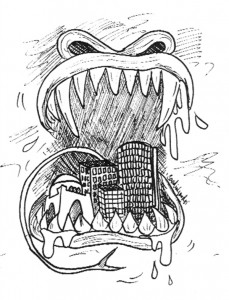
Sir,
In Karachi – notorious as the most dangerous city in Asia – human life has no value. If you are not affiliated with powerful political parties or their armed militias and get killed in the city, you are just a statistic, worth nothing except being counted and forgotten, as if this was your destiny and perhaps your fault.
This is all happening in the Islamic Republic of Pakistan, whose leaders never tire of performing Umrahs, but violate their oath to uphold the constitution and laws of this country and the protect the people whose interests they claim to safeguard.
Where will this new National Action Plan lead us in the fight against terrorism, if people continue to die in Karachi?
Rahat Siddiqi,
Karachi.
Health terrorism
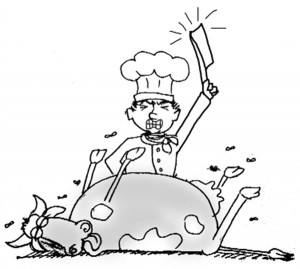
Sir,
There have been a number of news reports recently of the meat of dead animals being sold across the country by heartless butchers who have sold their very conscience.
Some of these butchers have also been selling the meat of dead donkeys as mutton and beef. When arrested and interrogated, the don’t show the least bit of repentance, and try to justify their crime saying they were poor and had to resort to such acts for livelihood. But their hypocrisy comes out when they are asked if they would feed the same meat to their own families just because they are poor.
This is a manifestation of the moral problems of our society. What we want for others is not what we want for ourselves. Some of these butchers have been arrested, but many others continue this shameful practice. It seems that like other forms of terrorism, we have also taken the lead in health terrorism – a kind not seen anywhere else in the world.
The government must not ignore this serious issue because the health of hundreds of thousands of people is at stake. This practice cannot be curbed by simply arresting and the culprits. They must be given exemplary punishment to set a precedent that acts as a deterrent.
The government must also pass a law on health terrorism, so that those deliberately affecting the health of the public – by selling rotten items for example – are given severe punishment.
Marria Qibtia Sikandar Nagra,
Lahore.
Heartbreaking

Sir,
It is unfortunate to see that relationships don’t mean anything in today’s society and people are tantamount to disposable commodities. The essence of interpersonal relationships – sincerity, honesty and truthfulness – is gradually disappearing.
Take marital commitments for example. Engagements arranged between the families of the girl and the boy are not valued the way they used to be. They do not honor these commitments and see no shame or embarrassment in breaking them without any valid reason. This is especially true for the families of boys, who initiate the proposal for marriage in our male-dominated society.
Sympathy, consideration, and an effort to resolve mutual problems to save the commitment are no longer deemed important, and sometimes even long-standing engagements are broken by the boys’ families, with no courtesy and no regard for girls’ emotions.
There is a dire need in our society for more courtesy and compassion in relationships involving people, especially marital commitments.
Aiyza Javaid,
Lahore.
Damned if we don’t
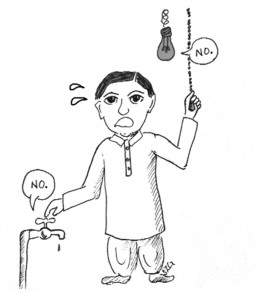
Sir,
I would like to draw the attention of Prime Minister Nawaz Sharif and PTI chairman Imran Khan towards the need to start a joint campaign for a broader consensus among all political parties on the construction of Kalabagh Dam immediately.
Nawaz Sharif had stated in 1998, when he was the prime minister of Pakistan, that he wanted to build the Kalabagh Dam. Similarly, Imran Khan’s party promised the nation in its manifesto that it will build the Kalabagh Dam. But they both backed out.
The proposed dam could generate up to 3,600 megawatts of electricity and irrigate 800,000 acres of cultivable land that is located 100 to 150 feet above the level of the River Indus.
According to eminent water expert Bashir A Malik, “Sindh and Pakhtunkhawh would become drought areas in the years to come if Kalabagh Dam was not built.”
It is the most urgent need of our nation to build Kalabagh Dam, so we should unite to save water and to save Pakistan.
Mansoor Ahmed,
Faisalabad.
Lessons from India
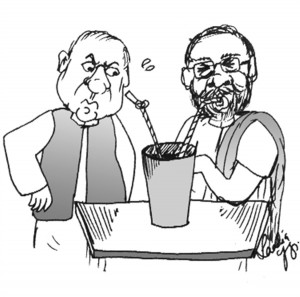
Sir,
US President Barack Obama has just completed his second official visit to India, following a similar visit by his Chinese counterpart. The unease seen in Pakistan regarding these visits is because the collective failure of Pakistan’s foreign and domestic policies over the past 40 years is haunting us.
Our failure to tread the constitutional path and the vision of Quaid-e-Azam is the root cause of all our problems. We allowed individual and institutional interests to prevail over national interests.
We need to analyze India’s strength and weakness in order to prepare ourselves to face a more powerful and economically strong neighbour whose tendency for regional hegemony is becoming more pronounced.
The biggest internal threat to India is the rise of Hindu fundamentalism. It is also facing several insurgencies and widespread poverty. Its strengths include uninterrupted constitutional democracy, economic growth, technological self reliance, a good tax-to-GDP ratio, and a strong judiciary. India survived its diversity by fiscal discipline, corporate regulatory controls, investing in education, and institution building.
The electoral success of the BJP headed by Narendra Modi – who has a controversial track record vis-a-vis members of minority faiths, especially Muslims – is a cause for concern. But the correct way for Pakistan to respond to this challenge is by following the constitution, and clamping down on corruption, bribery and abuse of power.
India adopted its constitution in 1949, replacing the Government of India Act of 1935, becoming a sovereign nation. It revoked land holdings acquired by those who conspired with colonial powers, and restructured its civil bureaucracy and uniformed forces to serve as servants of the people. While corruption has not been eradicated, its independent Internal Revenue System, police and judiciary have succeeded in maintaining some decorum and curtailing the flight of capital and human resources with the rule of law. Its diplomatic corps has managed to succeed where Pakistan has failed, because the Indian constitution eradicates conflict of interest by banning any public office holder to have dual nationality or own assets abroad. It has good ties with Iran, Afghanistan, Israel and most Arab countries, as well as the US and Russia, while also managing smooth relations with China.
Its institutional commitment to its constitution can be gauged from the refusal of the Indian army chief to intervene during Indira Gandhi’s controversial emergency rule.
Ali Malik,
Lahore.

